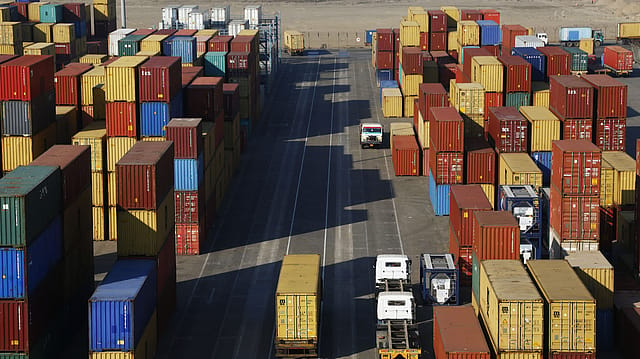WTO slashes 2025 global trade growth forecast to 3%
ADVERTISEMENT

Global merchandise trade growth for 2025 has been revised down to 3% by the World Trade Organisation (WTO) on Thursday, a decrease from its previous estimate of 3.3%, according to the latest report released by WTO. In its latest bi-annual trade report, ‘Global Trade Outlook and Statistics,’ the WTO economists noted that global merchandise trade turned upwards in the first half of 2024 with a 2.3% YoY increase.
The WTO raised its projection for merchandise trade growth to 2.7% in 2024, an increase from the previous estimate of 2.6%. “World real GDP growth at market exchange rates is expected to remain steady at 2.7% between 2023 and 2025. The fastest growing region in 2024 is likely to be Asia, where output is expected to climb to 4.0%, while the slowest growing region is likely to be Europe at 1.1%,” it adds.
The report cautioned that if the conflict in West Asia escalates, the repercussions would be felt globally, including through further disruptions to shipping and higher energy prices driven by increased risk premiums. “An escalation of the conflict in the Middle East could further disrupt shipping and raise energy prices given the region’s importance in petroleum production,” it states.
January 2026
Netflix, which has been in India for a decade, has successfully struck a balance between high-class premium content and pricing that attracts a range of customers. Find out how the U.S. streaming giant evolved in India, plus an exclusive interview with CEO Ted Sarandos. Also read about the Best Investments for 2026, and how rising growth and easing inflation will come in handy for finance minister Nirmala Sitharaman as she prepares Budget 2026.
It noted that while the disruptive impact of the Red Sea crisis has been limited thus far, other trade routes could be affected in a wider conflict. The risk of energy supply disruptions would also rise, given the region's significance in petroleum production. Higher energy costs would slow economic growth in importing economies, indirectly weighing on trade.
In the first half of 2024, global trade saw a year-on-year (YoY) increase of 2.3%, rebounding from a 1.1% contraction in 2023 caused by high inflation and rising interest rates. The report further highlighted that Europe continues to exert a negative influence on global trade in 2024, hampering both imports and exports, particularly in sectors such as chemicals, which experienced a drop after pandemic-driven demand surged.
“The main sectors driving European negative export performance are chemicals and vehicles. Organic chemicals, which are precursors to other medicines, are reverting to trend after a surge in demand during the pandemic,” it states.
The report states that the contraction in the automotive sector is raising concerns due to potential ripple effects across supply chains. Europe's imports of machinery have seen a sharp decline, especially from China, and this trend is also evident in other allied economies like the United States, South Korea, and Japan. However, imports from India and Vietnam are rising, suggesting these countries' growing roles as 'connecting economies'.
“On the import side, Asia presents a mixed picture. Chinese import growth remains moderate, while Singapore, Malaysia and other Asian economies, including India and Vietnam, show stronger growth,” it adds.
Conversely, Asian exports are on the rise, powered by leading manufacturing nations such as China, Singapore, and the Republic of Korea (South Korea). Meanwhile, Japan has seen little change, with its exports remaining stagnant in 2024 after a decline in 2023.
